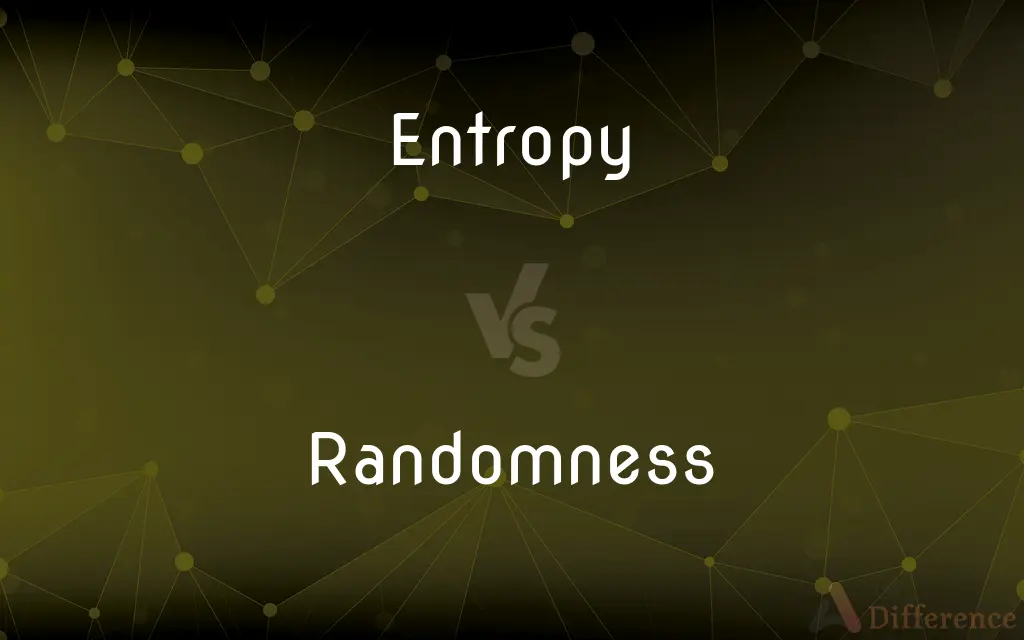Entropy vs. Randomness — What's the Difference?

Difference Between Entropy and Randomness
ADVERTISEMENT
Compare with Definitions
Entropy
Entropy is a scientific concept, as well as a measurable physical property that is most commonly associated with a state of disorder, randomness, or uncertainty. The term and the concept are used in diverse fields, from classical thermodynamics, where it was first recognized, to the microscopic description of nature in statistical physics, and to the principles of information theory.
Randomness
In common parlance, randomness is the apparent or actual lack of pattern or predictability in events. A random sequence of events, symbols or steps often has no order and does not follow an intelligible pattern or combination.
Entropy
Symbol S For a closed thermodynamic system, a quantitative measure of the amount of thermal energy not available to do work.
Randomness
Having no specific pattern, purpose, or objective
Random movements.
Entropy
A measure of the disorder or randomness in a closed system.
ADVERTISEMENT
Randomness
Mathematics & Statistics Of or relating to a type of circumstance or event that is described by a probability distribution.
Entropy
A measure of the loss of information in a transmitted message.
Randomness
Of or relating to an event in which all outcomes are equally likely, as in the testing of a blood sample for the presence of a substance.
Entropy
The tendency for all matter and energy in the universe to evolve toward a state of inert uniformity.
Randomness
The property of all possible outcomes being equally likely.
Entropy
The deterioration of a system or society, especially when it seems inevitable
City activists who fought entropy by organizing neighborhood groups.
Randomness
(mathematics) A type of circumstance or event that is described by a probability distribution.
Entropy
A measure of the disorder present in a system.
Randomness
A measure of the lack of purpose, logic, or objectivity of an event.
There was no randomness in the teacher's selection of the class representative.
Entropy
(Boltzmann definition) A measure of the disorder directly proportional to the natural logarithm of the number of microstates yielding an equivalent thermodynamic macrostate.
Randomness
(thermodynamics) a thermodynamic quantity representing the amount of energy in a system that is no longer available for doing mechanical work;
Entropy increases as matter and energy in the universe degrade to an ultimate state of inert uniformity
Entropy
(information theory) Shannon entropy
Randomness
The quality of lacking any predictable order or plan
Entropy
A measure of the amount of energy in a physical system that cannot be used to do work.
Entropy
The capacity factor for thermal energy that is hidden with respect to temperature.
Entropy
The dispersal of energy; how much energy is spread out in a process, or how widely spread out it becomes, at a specific temperature.
Entropy
A measure of the amount of information and noise present in a signal.
Entropy
(uncountable) The tendency of a system that is left to itself to descend into chaos.
Entropy
A certain property of a body, expressed as a measurable quantity, such that when there is no communication of heat the quantity remains constant, but when heat enters or leaves the body the quantity increases or diminishes. If a small amount, h, of heat enters the body when its temperature is t in the thermodynamic scale the entropy of the body is increased by h ÷ t. The entropy is regarded as measured from some standard temperature and pressure. Sometimes called the thermodynamic function.
The entropy of the universe tends towards a maximum.
Entropy
(communication theory) a numerical measure of the uncertainty of an outcome;
The signal contained thousands of bits of information
Entropy
(thermodynamics) a thermodynamic quantity representing the amount of energy in a system that is no longer available for doing mechanical work;
Entropy increases as matter and energy in the universe degrade to an ultimate state of inert uniformity
Share Your Discovery

Previous Comparison
Hiya vs. Howdy
Next Comparison
Nuance vs. Minute














































